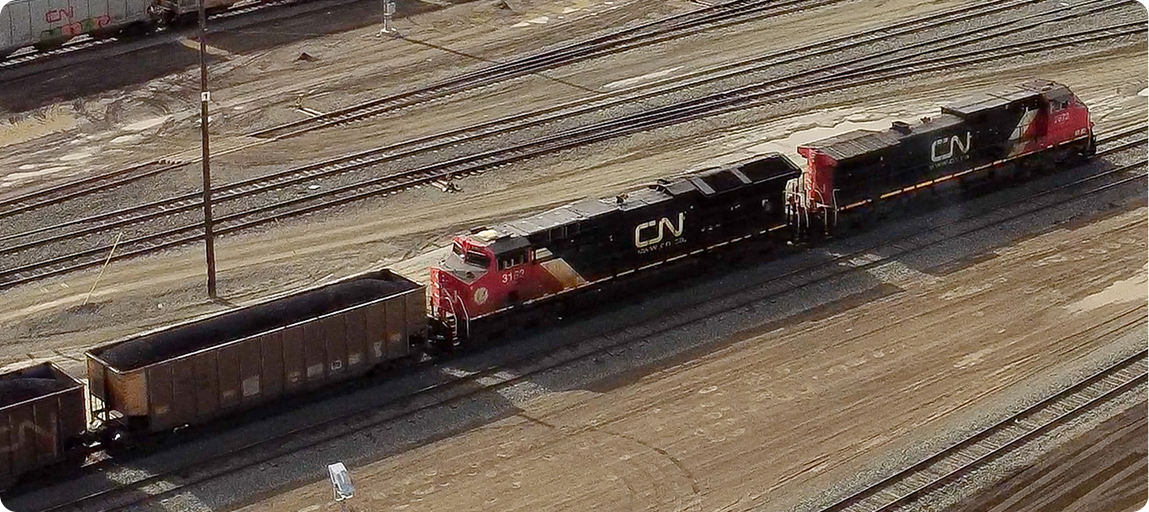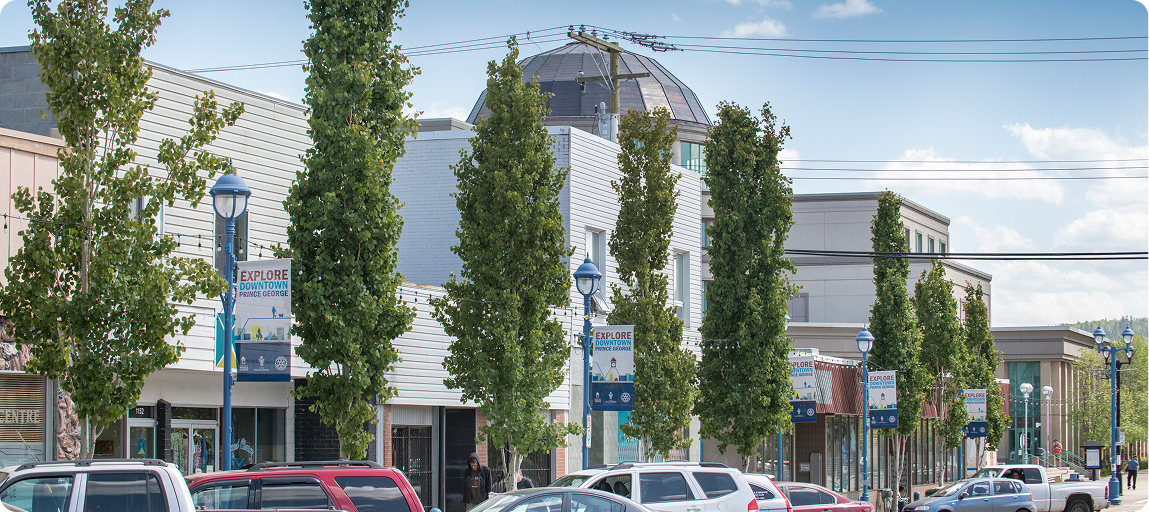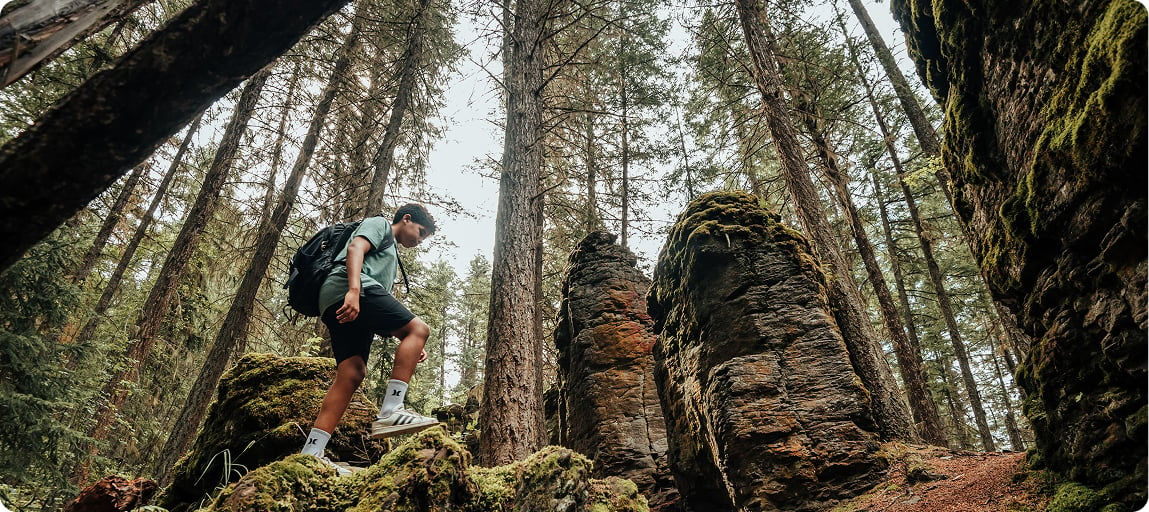Cariboo, British Columbia
The Cariboo region covers much of the northern interior of British Columbia, stretching from the Cariboo Plateau in the west to the valleys of the Cariboo and Rocky Mountain ranges. It serves as a strategically located resource and service corridor that connects central and northern British Columbia to major domestic and international markets.
Many large natural resource companies base their operations here, supported by abundant raw materials, a skilled and adaptable labour force, a strong infrastructure and supports that link to global distribution networks. Mining, forestry, ranching, and agriculture remain core economic drivers, alongside construction, manufacturing, retail, and professional services.
New opportunities are emerging in clean energy, life sciences advanced wood products, agritech, and value-added manufacturing, all enabled by competitive land costs, multimodal transportation options, and access to regional post-secondary institutions that help supply talent and innovation.

Regional Advantages

Strategic Transportation & Export Connectivity
With railways, highways, and airports nearby, the Cariboo region is positioned as a multimodal logistics platform connecting Northern British Columbia to Pacific ports and major Canadian urban centres. Highways 16 and 97, CN Rail mainlines, and Prince George Airport (YXS) provide efficient access to container terminals, bulk export facilities, and national distribution networks, supporting supply chains for forestry, mining, agrifood, and manufacturing investors.

Diversified Urban–Rural Industrial Ecosystem
With four main urban centres and a large rural population, the Cariboo region offers a diversified economic base that combines urban service hubs with resource rich rural areas. Prince George, Quesnel, 100 Mile House and Williams Lake function as regional centres for health care, education, engineering, logistics, and professional services, while surrounding communities provide access to timber, minerals, agricultural land, and clean energy resources. This integrated ecosystem supports scalable operations from greenfield industrial projects to regional headquarters.

Cost Competitive Operating Environment
Inexpensive housing, relative to other mid-large urban centers, offers affordability advantages and ability to purchase homes in the region. Lower residential and commercial real estate costs, competitive industrial land pricing, and access to some of North America’s most competitive clean electricity rates contribute to a favourable total cost of ownership for employers. The region’s affordability supports workforce attraction and long-term talent retention for industrial, technical, and professional roles.

Talent Attraction & Retention Through Quality Of Life
Activities such as fishing, hiking, camping, snowmobiling and other winter sports contribute to a four-season outdoor environment that helps employers attract and retain skilled workers and their families. This quality of life, combined with short commute times and access to regional education and training providers, underpins stable labour force participation for industrial and service-sector employers.
Key Sectors
Economic Advantages
Prince George
Prince George is situated in the heart of the province, 800 km north of Vancouver, British Columbia and 740 km west of Edmonton, Alberta. Resting at the junction of major provincial Highways 16 and 97, Prince George is also located at the confluence of the Fraser and Nechako Rivers. Established on the traditional territory of the Lheidli T’enneh, Prince George is surrounded by vast natural beauty, yet offers full urban amenities and superior connectivity to global destinations. The Prince George economy is well-diversified across all sectors. Over recent decades, Prince George has developed from a mainly forest-based economy to a city that has a strong natural resource base but also supplies goods and services for a broad range of sector activities throughout Northern BC, within Canada and internationally. Prince George’s five largest employment sectors are: healthcare & social assistance, wholesale & retail trade, manufacturing, construction, and educational services.
Quesnel
Quesnel is located in the central interior of British Columbia, Canada at the confluence of the Quesnel and Fraser Rivers. It is a commercial centre for more than 23,000 residents living in the North Cariboo and is well served by rail, road, and air connections to major centres in BC and beyond. Quesnel is located on Highway 97, the major north-south corridor in BC and only 120 km away from Highway 16, the major east-west corridor from western and central BC to Alberta. World class recreation can be found within minutes of Quesnel.
Williams Lake
Williams Lake is a major service centre to the vast, picturesque Cariboo Chilcotin region of British Columbia. Professional staff and pro-business governments have earned the city the reputation as being one of the best and most accommodating in the province to do business with. Williams Lake and area has a thriving and diverse economy supported by forestry, mining, agriculture, tourism and most of all our people. For lifestyle, Williams Lake can’t be beat. A modern city with all the major amenities, our great hometown and western hospitality makes this an ideal place for people raising a family, starting a business or retiring. The surrounding pristine wilderness provides unlimited playground while the conveniences of city living are just outside your door.
Communities
Prince George, Quesnel, 100 Mile House and Williams Lake are the key cities that contribute to Cariboo’s population of 169,712 people. Resource-based industries play a strong role in the area’s economy. A strong economic community development team is supporting local economic growth and stability, working with First Nations, regional stakeholders, small business members and industry representatives. Investors can access coordinated support for site selection, permitting navigation, workforce development, and partnership opportunities across these communities, enabling faster project timelines and reduced investment risk.
Regional Labour Force ProfileEconomic Development Organizations
First Nations
The region is characterized by a significant Indigenous presence and leadership in economic development, with First Nations playing a central role in forestry, mining, energy, tourism, and infrastructure projects.
Development corporations— owned collectively by aligned First Nations or by individual First Nations— are the primary vehicles by which First Nations pursue and advocate for sustainable economic development in the region. These development corporations are active partners in joint ventures, impact benefit agreements, and equity participation models, offering investors structured pathways to build long‑term, mutually beneficial partnerships and advance ESG and reconciliation commitments.
Learn more about First Nations in BCEconomic Development Organizations
Logistics & Accessibility
Educational Institutions

The University of Northern British Columbia (UNBC) is a research-intensive public university with campuses across the Cariboo and Northern B.C. regions.

The College of New Caledonia is a comprehensive community college that delivers post-secondary training in health sciences, trades and technologies, business, university transfer, social services, and academic upgrading.

Thompson Rivers University (TRU) has a campus in Williams Lake, bringing multiple career preparation, trades and technology training, and university transfer programs and credits to the region.
Connect With a Regional Expert
Regional experts can help familiarize you with the amenities, infrastructure, and opportunities in each region. They can introduce you to the economic development offices and industry associations that will support the integration of your business into the province.







